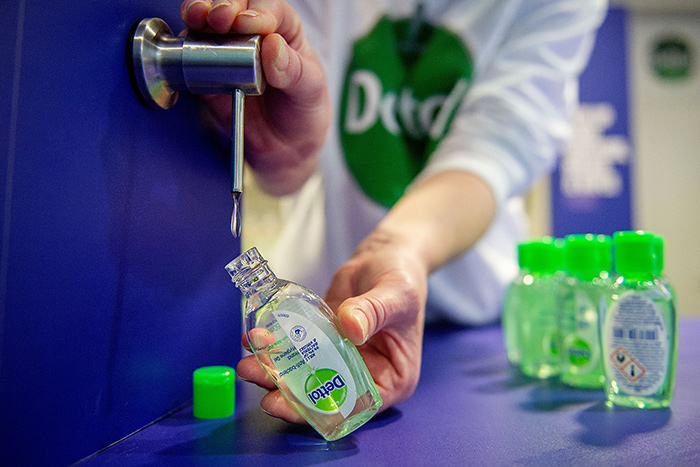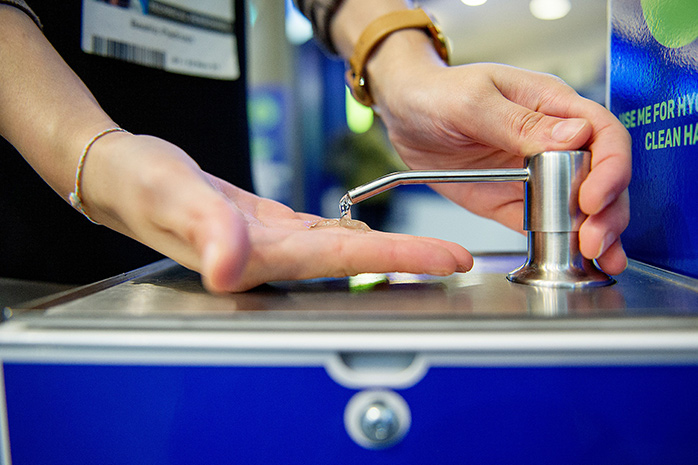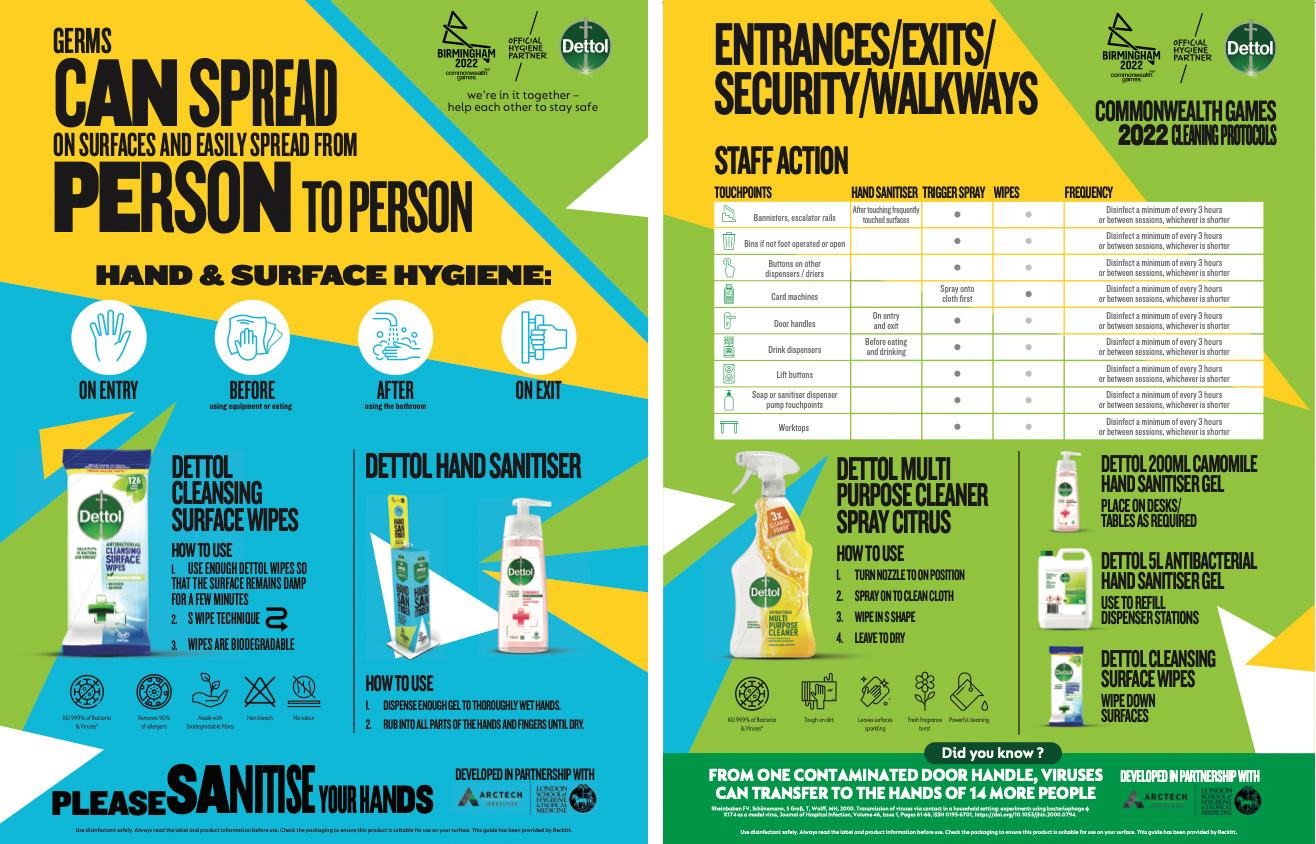How The Development Of Targeted Hygiene Protocols Is Helping To Create A More Hygienic, Time-Saving And Cost-Saving Birmingham 2022 Commonwealth Games
 By Dr Lisa Ackerley, CEnvH, FRSPH, Director of Medical and Scientific Engagement, Hygiene at Reckitt
By Dr Lisa Ackerley, CEnvH, FRSPH, Director of Medical and Scientific Engagement, Hygiene at Reckitt
In a world where it remains challenging to drive confidence, high standards of hygiene remain of great importance – in February 2022 according to Global Reckitt Covid Tracker, with 1000 individuals surveyed, 38% still choose where they visit based on disinfection standards1. Businesses, manufacturers and facilities management teams need to adopt smart cleaning and disinfection methods to rebuild and maintain patrons’ and workers’ confidence. But no expression has rung truer than “time is money” when it comes to the cleaning sector – and improving efficiency through a targeted hygiene approach can ultimately lead to lower operating costs.
Targeted hygiene means focusing on hygiene practices, places and moments when harmful microbes are most likely to spread in order to break the chain of infection2. This means recognising that the main sources of harmful microbes are not only places that are ‘dirty’ but also high-touch areas such as door handles or stair railings – and these microbes are moved around often by people3,4. Rather than attempt to clean and disinfect everything, Dettol Pro Solutions has developed a multifunctional approach to hygiene interventions based on the science of targeted hygiene to focus on key places and moments which will be most likely to break the chain of infection, whilst also offering time-saving and sustainability benefits.

With Dettol as the Official Hygiene Partner, this effective targeted hygiene approach is being put into action at the Birmingham 2022 Commonwealth Games with the organisations working closely together to implement a hygiene strategy that supports the delivery of this large scale event.
All businesses can adopt these three-stage targeted hygiene protocols to disinfect high-traffic and commonly-touched areas at the right times and frequency, optimising labour resources.
Stage 1: Identify and understand key moments and key surfaces

Identifying and understanding key hygiene moments is crucial to delivering an efficient solution. By using a risk-based approach to understand the areas that may need to be cleaned more frequently in shared spaces, as well as potential hotspots that are regularly touched and shared, such as lift buttons and door handles, not only can businesses help to boost confidence with patrons, but they can also ensure efficiency across their staffing teams. It has been shown that a reduction in risk can be achieved by disinfection interventions on frequently touched surfaces5 so our protocols recommend a frequency of disinfection according to risk, whilst also considering practicality. For example, it would be imperative that some surfaces such as gym equipment or in athlete’s accommodation between change overs be cleaned before and after use, but for door handles we recommend every two to three hours, depending upon use of the building.
Stage 2: Reference and apply science-backed hygiene interventions

Scientific evidence, insights and expertise should be employed to inform hygiene protocols. Dettol Pro Solutions’ team of virologists, microbiologists, public health and medical scientists has developed a custom, targeted hygiene programme for the Birmingham 2022 Commonwealth Games. The bespoke approach for the event has utilised the same scientific and technical expertise in the team that created and delivered bespoke protocols at COP26 to bring peace of mind to an expected one million attendees at the Games, which start on 28th July.
Interestingly, hand hygiene is regarded as one of the most important hygiene measures adopted post-pandemic – according to a survey of 14,000 people in the UK, with 38% of people agreeing with the statement, only followed by getting vaccinated and mask-wearing with 74.5% and 43% respectively6. However, it is known that this knowledge does not necessarily translate into practice7. Indeed some studies have found lack of hand hygiene after using the bathroom to be as high as 80%8. Understanding these facts, Dettol Pro Solutions’ team of experts have used a number of scientific elements to determine the placement of 2,800 Dettol hand sanitiser dispensers over the 12-day event.
Stage 3: Develop and generate hygiene understanding
 The pandemic has reshaped hygiene expectations and hands, air and surfaces are domains with the greatest hygiene concerns. Cleaning and the disinfection of surfaces has become a core part of our daily life, with having a sufficient understanding of hygiene protocols becoming more central to people’s lives.
The pandemic has reshaped hygiene expectations and hands, air and surfaces are domains with the greatest hygiene concerns. Cleaning and the disinfection of surfaces has become a core part of our daily life, with having a sufficient understanding of hygiene protocols becoming more central to people’s lives.
As part of the Dettol Pro Solutions’ partnership, athletes and volunteers at the Games will be provided with hygiene kits and spectators will have access to hand sanitiser dispensers throughout the venues, supported by key messaging to help deliver hygiene education.
The Birmingham 2022 Commonwealth Games celebrates human achievement, perseverance, and dedication; attributes that Reckitt champions in its purpose to protect, heal and nurture in the relentless pursuit of a cleaner, healthier world.
To find out more about Dettol Pro Solutions visit https://www.reckittpro.co.uk/ or follow us on LinkedIn.
Click the below image to enlarge it.
References
1 Global Reckitt Covid Tracker, n= 1000, Jan 2021
2 IFH. 2019. What is home and everyday life hygiene? Available at: https://www.ifh-homehygiene.org/what-home-hygiene#IFHtargetedapproach
3 Bloomfield SF, Scott EA. A risk assessment approach to use of antimicrobials in the home to prevent spread of infection. Am J Infect Control. 2013 May;41(5 Suppl):S87-93.
4 Bloomfield SF, Rook GA, Scott EA, Shanahan F, Stanwell-Smith R, Turner P. Time to abandon the hygiene hypothesis: new perspectives on allergic disease, the human microbiome, infectious disease prevention and the role of targeted hygiene. Perspect Public Health. 2016 Jul;136(4):213-24
5 Reynolds, K. A., Beamer, P. I., Plotkin, K. R, Sifuentes, L. Y., Koenig, D. W. & Gerba, C. P. 2016. The healthy workplace project: Reduced viral exposure in an office setting. Archives of Environmental & Occupational Health, 71 (3), 157-162).
6 Global WebIndex, UK February 2022, n=14,000
7 Lee, H. K., Abdul Halim, H., Thong, K. L., & Chai, L. C. (2017). Assessment of Food Safety Knowledge, Attitude, Self-Reported Practices, and Microbiological Hand Hygiene of Food Handlers. International Journal of Environmental Research and Public Health. 14(1), 55. https://doi.org/10.3390/ijerph14010055
8 Sturgeoner, B.V.; Chapman, B.J.; Powell, D.A. University students’ hand hygiene practice during a gastrointestinal outbreak in residences: What they say they do and what they actually do. J. Environ. Health 2009, 72, 24–28.
8 Sultana, M.; Mahumud, R.A.; Sarker, A.R.; Hossain, S.M. Hand hygiene knowledge and practice among university students: Evidence from Private Universities of Bangladesh. Risk Manag. Healthc. Policy 2016, 9, 13–20.










































